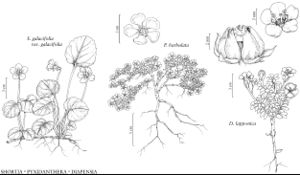Shortia
Amer. J. Sci. Arts 42: 48. 1842, name conserved ,.
Herbs, colonial, scapose, rhizomatous; rhizome slender, scale-leaved, lignescent. Stems erect, unbranched. Leaves basal, rosulate from rhizome buds, 30–80 mm; petiole present; blade orbiculate to elliptic-orbiculate, ovate-oblong, or ovate, margins coarsely crenate-serrate, apex emarginate to truncate, surfaces glabrous, pinnately veined. Scapes bracteate, elongating after flowering. Inflorescences solitary flowers. Flowers: sepals distinct; petals connate in proximal 1/4–1/2, corolla campanulate to funnelform, 15–25 mm, lobes white to rose-purple, margins obtusely toothed to laciniate or fringed; anthers 2-locular, without basal spurs, longitudinally dehiscent; filaments adnate to corolla tube; staminodes present. x = 6.
Distribution
se United States, e Asia.
Discussion
Species 6 (1 in the flora).
The Asian species of Shortia occur in Japan (three endemic), Taiwan and the Ryukyus (one endemic), and Yunnan Province, China (one endemic).
